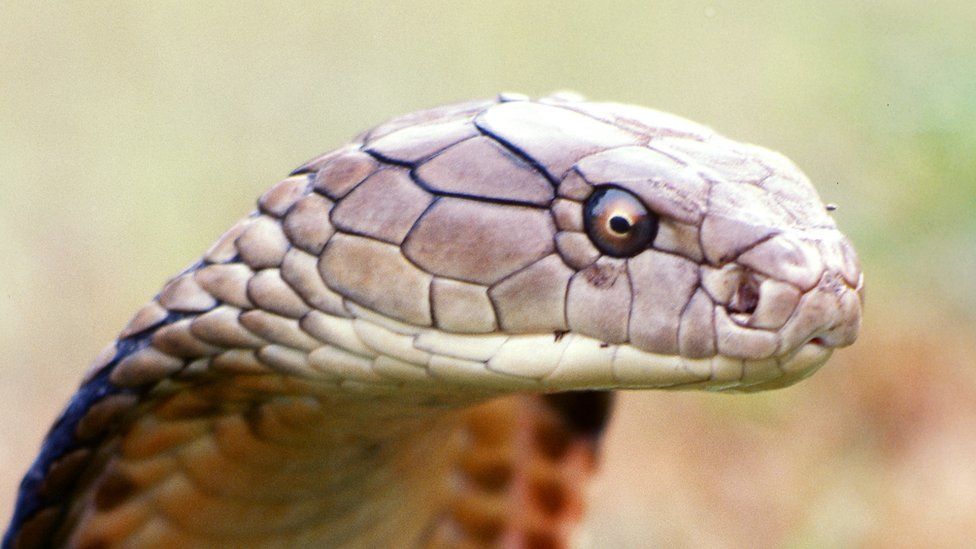Cobras among Northern Ireland's 'wild dangerous' pets
- Published

There are 90 dangerous wild animals being kept as pets in Northern Ireland, including two tigers, emus and a wolf .
The number of venomous snakes legally in private ownership has jumped from eight in 2016 to 33 in January 2018.
According to figures obtained by BBC News NI, the 90 animals are owned by 22 people.
The Department of Agriculture, Environment and Rural Affairs (DAERA) holds 17 active licenses, with five pending renewal.
DAERA has not seized any illegally held wild animals in the last three years.
One animal on the dangerous list, a raccoon, escaped from its owner in County Antrim in that period.
The break out was reported to the department and logged with the police but the animal was later recovered by the licensee.
Snakes
Amongst the venomous snakes is a single inland taipan, considered to be the most venomous in the world.
The venom from one bite is enough to kill 100 fully grown men.
It is, however, very rare for humans to be bitten and in the few cases that have occurred, anti-venom treatment has been successful.
Other snakes privately owned include the red spitting cobra, the Sri Lankan palm pit viper and the western diamondback rattlesnake.
What to do if you are bitten by a poisonous snake? Advice from the NI Health and Social Care Board:
Anti-venoms for exotic species are generally not held within hospitals in the UK, with the exception of some specialist centres.
A hospital doctor treating a bite by an exotic snake would contact a consultant physician who is a specialist in snake bites, through the National Poisons Information Service.
The specialist will determine with the treating doctor how serious the case is, select the antidote required if need be and arrange for it to be transferred urgently to the treating hospital.
There are 18 different anti-venoms held in the UK by the Department of Health and it is essential to identify the snake species precisely so the correct one can be used.
Immediate treatment such as pain relief, fluids or adrenaline for cases of anaphylaxis would be available in all hospitals.
The Dangerous Wild Animals (Northern Ireland) Order 2004 (DWA) came into effect in December 2006.
Its aim is to regulate the keeping of dangerous wild animals, identified in its schedule, by private individuals.
Up until the order came into effect there was no legal regulation of the keeping of wild animals here.
Currently a licence to own a dangerous wild animal in Northern Ireland costs £80 per year.
Brendan Mullan, the chief executive of the Ulster Society for the Prevention of Cruelty to Animals (USPCA), said they had lobbied for the legislation, pointing out that they once had five tigers and over 30 lions in its Benvarden shelter and that the number of big cats in private hands has plummeted as a result of the order.
The USPCA does not approve the keeping of exotic animals as pets, regardless of their legal status.
'Not companions'
"These creatures should not be regarded as companion animals," said Mr Mullan.
"Their keeping requires a high level of expertise and considerable expense.
"Failure to provide correct conditions will inevitably cause problems which could breach welfare legislation and leave owners at risk of prosecution.
"Many local veterinarians have treated reptiles for lamp burns and fungal infections that are a result of inexperience and ignorance. Many other creatures perish and are disposed of without record," he added.
The granting of a licence under the Dangerous Wild Animals order requires criteria to be satisfied and a vet to carry out an inspection on the accommodation, space and equipment provided for the animal.
However, it does not require the keeper to demonstrate expertise in the animal's husbandry. The USPCA regard this as a shortcoming in the legislation.
The USPCA also believes that it is "probable" there are unregistered dangerous wild animals in private hands in Northern Ireland and those are likely to be reptiles.
The animals currently licensed under the Dangerous Animals order in Northern Ireland:
Birds
- Emu - 11
Mammals
- Wolf - 1
- Black-capped capuchin - 4
- Cheetoh (cat) - 1
- Ring-tailed lemur - 9
- Coati - 5
- Tiger - 2
- Kinkajou- 1
- Raccoon- 18
- Squirrel monkey - 2
Reptiles
- Spectacled camian - 1
- Gila monster - 1
- Cuviers Dwarf caiman - 1
Venomous snakes
- Gaboon viper - 1
- West African Gaboon Viper - 1
- Rhinoceros-horned viper - 2
- Mangrove snake - 1
- Golden eyelash viper - 1
- Horned viper - 1
- Western diamondback rattlesnake - 4
- Mohave rattlesnake - 1
- Sharp-nosed pit viper - 1
- Eastern green mamba - 1
- Black mamba - 1
- Western green mamba - 1
- Saw-scaled viper - 1
- Chinese cobra - 1
- Monocled cobra - 4
- Indian cobra - 1
- Red Spitting cobra - 1
- Indochinese spitting cobra - 1
- King cobra - 1
- Inland Taipan - 1
- Eastern pygmy rattlesnake - 2
- White-lipped pit viper - 2
- Sri Lankan palm pit viper - 1
- Vogel's viper - 1
- Published23 May 2016
- Published15 June 2016
- Published7 August 2017
- Published8 November 2007
- Published13 October 2003